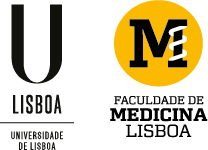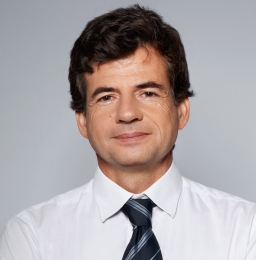Mission
The mission of the University Clinic of Rheumatology is to develop teaching and research by promoting clinical practice of high competence and differentiation in the field of Rheumatology.
Vision
The vision of the University Clinic of Rheumatology is to be recognized within 5 years as an international reference in teaching, research and clinical practice in Rheumatology, and to be formally classified as a Centre of Excellence in Rheumatology by the European Alliance of Associations for Rheumatology (EULAR).
Goals
- Quality and demanding undergraduate and postgraduate training, with emphasis on practice
- Translational and clinical research, with strong emphasis on clinical trails
- Differentiation of areas of clinical performance for a better quality and efficacy of the medical act.
The University Clinic of Rheumatology has been run by Prof. João Eurico Cabral da Fonseca since 2010, who directly coordinates all aspects of the teaching of Rheumatology at the Faculty of Medicine of the University of Lisbon. The Rheumatology Research Unit of the Institute of Molecular Medicine of the Faculty of Medicine of the University of Lisbon has been led by Prof. João Eurico Cabral da Fonseca since 2004 and has been functionally linked to the University Clinic of Rheumatology since 2010. Since December 2015 the Director of the University Clinic of Rheumatology is also the Director of the Department of Rheumatology of the Lisboa Norte University Hospital Centre, Santa Maria Hospital. Consequently there is an integration of teaching, research and clinical activities in this University Clinic, in a model that reflects the spirit of the Lisbon Academic Medical Centre[PE1] .
Teaching
- 3rd year: Locomotor System Diseases subject
- Rheumatology module in the subject of Medicine II in the 5th year
- Optional subject of Rheumatology
- Tutorial clinical practice in Rheumatology
- Clinical research internships in Rheumatology
- Supervision of integrated master's theses in Medicine
- Rheumatology teaching participations in Orthopaedics, Paediatrics, Physiopathology and Introduction to clinical practice.
Additionally, it provides support to the teaching of the Integrated Masters in Biomedical Engineering, taking part in the coordination of the Masters, in the coordination of the subject Tissue Biomechanics and participation in practical classes of Anatomy and Histology, theoretical classes of Stem Cell Bioengineering and Tissue Biomechanics.
Research
The scientific activity has been characterised by the study of the initial phase of joint inflammation and the search for diagnostic, prognostic and therapeutic response markers. The research involves the use of human samples and clinical information, being complemented, when necessary, with the use of animal models. Integration into clinical activity has been characterised by an effort to organise differentiated consultations in specific clinical areas, to allow a more homogeneous medical practice, following clinical recommendations and supported by accurate clinical records using the Reuma.pt electronic medical record, which was developed by this team. Clinical activity is closely linked to research and teaching.
Goals
- Maximum accessibility to Rheumatology healthcare
- Optimisation of the connection with General and Family Medicine, enabling a higher rate of first consultations, without the need for subsequent monitoring
- Differentiation of areas of clinical practice to improve the quality and effectiveness of the medical act
- Quality undergraduate and postgraduate training, with emphasis on the practical aspect
- Translational and clinical research, with strong emphasis on clinical trials.
In order to implement these goals, the department has an structure based on rigorous monitoring of patient referrals, with an electronic triage system that prioritises appointments and with a face-to-face triage that observes all referred patients. Based on this system patients can be referred back to General Practice on their first visit, referred to one of the specialist consultations if the diagnosis is immediately clarified, or referred to the General Rheumatology consultation for further diagnostic progress. Patients who need diagnostic and therapeutic techniques are referred to the Techniques Unit, patients who need intravenous treatments or biological therapies are monitored in the Day Hospital and those who need hospitalisation are referred to the Inpatients Unit. The department also carries out training and research activities.
The areas in which the department operates are summarised below.
- Assistance Activity:
- Outpatient Rheumatology consultation
- Psoriatic Arthritis consultation (with Dermatology consultation)
- Rheumatoid Arthritis consultation
- Early Arthritis consultation
- Dietetics and Nutrition in Rheumatology consultation
- Bone Metabolic Diseases consultation
- Rheumatic Diseases in Pregnancy consultation (with Obstetrics consultation)
- Juvenile Rheumatic Diseases consultation
- Systemic Sclerosis consultation
- Spondylarthritis and Uveitis consultation
- Pulmonary Hypertension of Rheumatic diseases consultation (with Cardiology and Pneumology consultation)
- Diffuse Pulmonary Diseases consultation (with Pulmonology consultation)
- Systemic Lupus Erythematosus consultation
- Mini-Arthroscopy Consultation
- Myositis consultation (with Dermatology and Physical and Rehabilitation Medicine consultation)
- Osteoarthritis and Microcrystalline Arthritis consultation
- Psychology consultation
- Nutrition consultation
- General Rheumatology consultation
- Sjogren's syndrome consultation (with Stomatology and Ophthalmology consultation)
- Triage consultation
- Vasculitis consultation
- Multidisciplinary consultation of Rheumatology/Pathological Anatomy
- Multidisciplinary consultation of Rheumatology / Imagiology
- Multidisciplinary consultation of Rheumatology / Dermatology
- Multidisciplinary consultation of Rheumatology / Ophthalmology in adults
- Multidisciplinary consultation of Rheumatology / Orthopaedics
- Pre-conceptional Rheumatology Diseases consultation (with Obstetrics consultation)
- Rheumatology Inpatients Unit
- Inpatient care of rheumatic patients
- Support for rheumatic patients admitted to other services
- Post-discharge consultation
- Rheumatology Techniques Unit
- Arthrocentesis
- Abdominal subcutaneous fat biopsy
- Salivary glands biopsy
- Ultrasound-guided synovial biopsy
- Capillaroscopy
- Ultrasound of the locomotor system
- Epidural infiltration
- Peri-articular infiltration
- Intra-articular infiltration (synoviorthesis)
- Joint lavage
- Mesotherapy
- Polarized light microscopy
- Mini-Arthroscopy
- Densitometry
- Echoguided diagnostic procedures
- Echoguided therapeutic procedures
- Radioguided therapeutic procedures
- Pathergy test
- Rheumatology Day Hospital
- Consultation for deciding the beginning of biological therapies
- Consultation for monitoring the efficacy and safety of biological therapies
- Administration of intravenous therapies
- Subcutaneous therapy teaching and administration
- Paediatric Rheumatology Unit
- Paediatric Rheumatology support for patients admitted to the Paediatrics Department
- Consultation for Autoinflammatory Diseases (with immunodeficiencies and genetics)
- Consultation for juvenile Rheumatic Diseases
- Paediatric Rheumatology consultation
- Consultation for Transition from Paediatric to Adult Rheumatology
- Multidisciplinary consultation Pediatric Rheumatology / Pediatric Physical Medicine and Rehabilitation
- Multidisciplinary Consultation Paediatric Rheumatology / Pediatric Ophthalmology
- Periods dedicated to Paediatric Patients in Rheumatology Day Hospital
- Diagnostic and therapeutic Paediatric Rheumatology Techniques Unit
- Metabolic Bone Diseases Unit
- Outpatient consultation dedicated to established (fracture) and/or secondary osteoporosis, Paget's bone disease, adults with chronic alterations of mineral metabolism and/or chronic disorders of bone mineralisation, adults with osteogenesis imperfecta, osteopetrosis and other rare bone dysplasias
- Consultancy for the Reference Centre for Family Paramyloidosis at Santa Maria Hospital/CHLN
- Consultancy for the Reference Centre for Hereditary Metabolism Diseases at Santa Maria Hospital/CHLN
- Evaluation of Bone Mineral Density (Bone Densitometry at the Rheumatology Techniques Unit)
- Evaluation of body composition by Dual Energy X-ray Densitometry (DXA) in the context of clinical research
- Accessibility to specific therapies, including subcutaneous administration teaching or administration at Rheumatology Day Hospital
- Rheumatology Clinical Trials Unit
- Collaboration in the development of the Clinical Research Centre
- Planning of investigator-initiated clinical trials
- Implementation of phase I, II, III and IV multicentric clinical trials in the department
- Selection of candidate patients for clinical trials
- Consultations and treatments associated with clinical trials
- Education and training in clinical trials
- Rheumatology consultation at Hospital do Litoral Alentejano
- 1 monthly consultation carried out in parallel in two offices by two doctors (6+6h)
Training Activity
- Undergraduate training activity: collaboration in teaching the subjects: Biochemistry, Anatomy and Histology of the Integrated Masters in Biomedical Engineering, theoretical and practical free course on pathophysiological mechanisms of rheumatic diseases: from auto-inflammation to autoimmunity, Diseases of the Locomotor System, Introduction to the Clinic, Optional Rheumatology, Clinical Tutoring Practices in Rheumatology and Medicine II. Collaboration in exchange programmes.
- Postgraduate training activity: training of interns of Rheumatology specialty (around 12 permanently), training of interns in General and Family Medicine, Physical Medicine and Rehabilitation, Internal Medicine, Neurology and Imaging. Training of interns from other European countries, Brazil and Portuguese-speaking African countries..
- Internal Training Activity of the Department: promotes weekly meetings to discuss issues, protocols, recommendations and research projects. Collaborates in training activities organised by Scientific Societies. Promotes the CAML Rheumatology Series.
Research Activity
The Rheumatology Department carries out intense research activity in various areas of Rheumatology in close collaboration with the Rheumatology Research Unit of the Institute of Molecular Medicine of the Faculty of Medicine of the University of Lisbon. As a result, several of its members are in doctoral programmes.
Hospital de Santa Maria - Piso 2
Secretariado: Alexandra Teixeira
Contacto Interno: 44142



